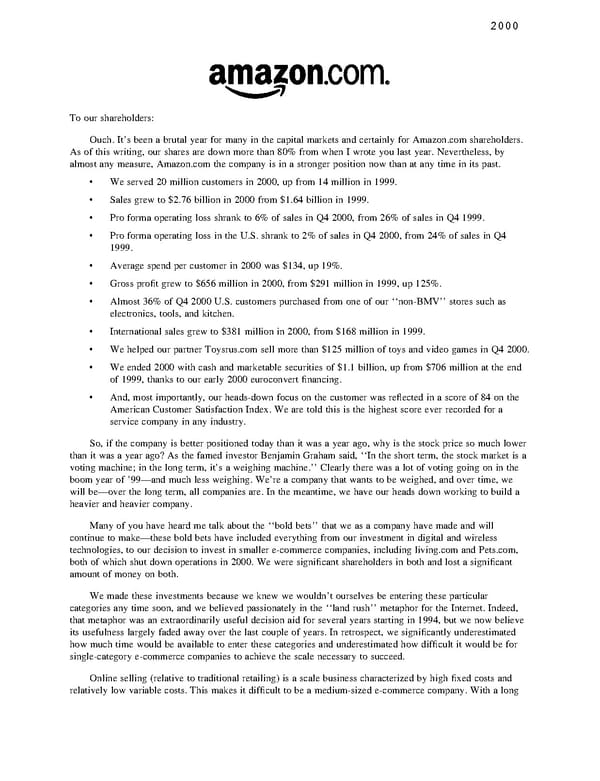2000 To our shareholders: Ouch. It’s been a brutal year for many in the capital markets and certainly for Amazon.com shareholders. As of this writing, our shares are down more than 80% from when I wrote you last year. Nevertheless, by almost any measure, Amazon.com the company is in a stronger position now than at any time in its past. • Weserved 20 million customers in 2000, up from 14 million in 1999. • Sales grew to $2.76 billion in 2000 from $1.64 billion in 1999. • Pro forma operating loss shrank to 6% of sales in Q4 2000, from 26% of sales in Q4 1999. • Pro forma operating loss in the U.S. shrank to 2% of sales in Q4 2000, from 24% of sales in Q4 1999. • Average spend per customer in 2000 was $134, up 19%. • Gross profit grew to $656 million in 2000, from $291 million in 1999, up 125%. • Almost 36% of Q4 2000 U.S. customers purchased from one of our ‘‘non-BMV’’ stores such as electronics, tools, and kitchen. • International sales grew to $381 million in 2000, from $168 million in 1999. • Wehelped our partner Toysrus.com sell more than $125 million of toys and video games in Q4 2000. • Weended 2000 with cash and marketable securities of $1.1 billion, up from $706 million at the end of 1999, thanks to our early 2000 euroconvert financing. • And, most importantly, our heads-down focus on the customer was reflected in a score of 84 on the American Customer Satisfaction Index. We are told this is the highest score ever recorded for a service company in any industry. So, if the company is better positioned today than it was a year ago, why is the stock price so much lower than it was a year ago? As the famed investor Benjamin Graham said, ‘‘In the short term, the stock market is a voting machine; in the long term, it’s a weighing machine.’’ Clearly there was a lot of voting going on in the boom year of ’99—and much less weighing. We’re a company that wants to be weighed, and over time, we will be—over the long term, all companies are. In the meantime, we have our heads down working to build a heavier and heavier company. Many of you have heard me talk about the ‘‘bold bets’’ that we as a company have made and will continue to make—these bold bets have included everything from our investment in digital and wireless technologies, to our decision to invest in smaller e-commerce companies, including living.com and Pets.com, both of which shut down operations in 2000. We were significant shareholders in both and lost a significant amount of money on both. Wemadethese investments because we knew we wouldn’t ourselves be entering these particular categories any time soon, and we believed passionately in the ‘‘land rush’’ metaphor for the Internet. Indeed, that metaphor was an extraordinarily useful decision aid for several years starting in 1994, but we now believe its usefulness largely faded away over the last couple of years. In retrospect, we significantly underestimated how much time would be available to enter these categories and underestimated how difficult it would be for single-category e-commerce companies to achieve the scale necessary to succeed. Online selling (relative to traditional retailing) is a scale business characterized by high fixed costs and relatively low variable costs. This makes it difficult to be a medium-sized e-commerce company. With a long
 Amazon Shareholder Letters 1997-2020 Page 19 Page 21
Amazon Shareholder Letters 1997-2020 Page 19 Page 21